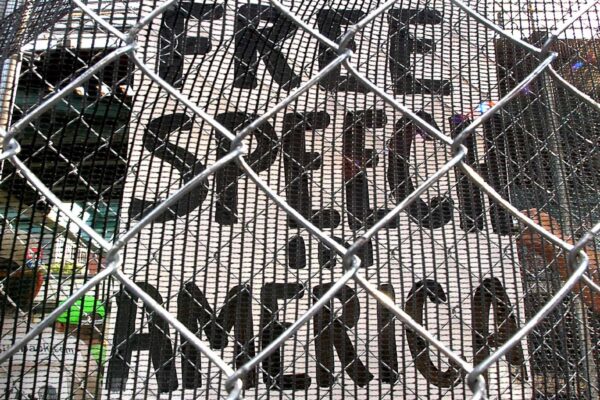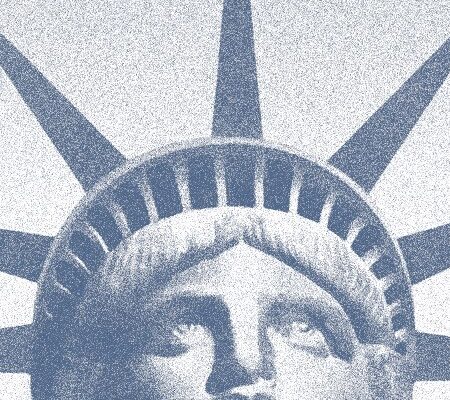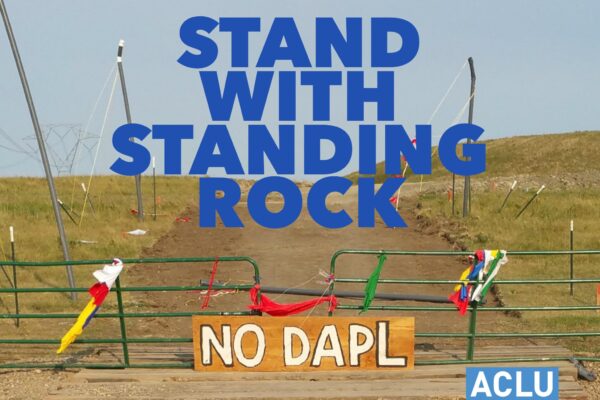The American Civil Liberties Union of North Dakota last night sent a letter to Governor Dalrymple and the Morton County Sheriff urging them to protect the First Amendment rights of protesters at the site of the Dakota Access Pipeline construction.
In the letter, Policy Director Jennifer Cook and Legal Director Courtney Bowie write, “We write to you regarding disturbing news reports and witness statements to us regarding the obstruction of the First Amendment right to protest. With the continuing protest at the construction site for the Dakota Access Pipeline in Morton County, it is imperative that the free speech rights of the public and the rights of the press be protected and respected by all law enforcement officials.”
Recently Governor Dalrymple called for the closure of Highway 1806 to those traveling to the protest site, alleging the potential for illegal activities at the the protests, citing the arrests of 29 individuals for non-violent offenses such as trespassing.
“If the highway remains closed and we receive additional information regarding violations of the rights of individuals to protest peacefully, we will pursue all legal remedies available to us to prevent further abuses. We ardently hope that the government works with us to ensure that peaceful protest is permitted and not hindered by governmental action.”
Read the full text of the letter below or download the PDF copy.
Re: Governmental Responsibility to Protect First Amendment Rights
Dear Sirs,
We write to you regarding disturbing news reports and witness statements to us regarding the obstruction of the First Amendment right to protest. With the continuing protest at the construction site for the Dakota Access Pipeline in Morton County, it is imperative that the free speech rights of the public and the rights of the press, be protected and respected by all law enforcement officials.
Protest is an Important Core First Amendment Activity
Free speech often involves protest, raised voices, anger, and the airing of grievances. Members of the public, including the press and aggrieved individuals, must be free to protest in public without interference from government officials, including police. We understand that there is a difference between exercising one’s First Amendment right to assemble and breaking the law. Law enforcement agencies must recognize, however, that the Constitution firmly protects protests even when – and especially when – they stir anger, question preconceptions, challenge government policy, and induce dissatisfaction with the status quo. Speech and related activities, especially speech during times of unrest and public crisis can – at times – be loud and raucous. The First Amendment safeguards protestors’ rights to awaken passions, to make the public aware of their positions and opinions. America’s robust tradition of free speech allows us all to effect change by making our voices heard. This is crucial to ensuring that the government remains responsive to the will of the people; it is what makes our country great and is the reason the First Amendment must be carefully and consistently protected. Each and every law enforcement agent has an affirmative duty to ensure that the rights of protestors and the press are protected.
The Protest in Morton County
Indigenous people of the Standing Rock Sioux Reservation and around the country have concerns regarding their drinking water and the construction of the Dakota Access oil pipeline near it. They have set up camps, demonstrated, picketed and prayed near the entrance to the construction area in Morton County. There have been very few incidents of violence because only twenty-nine individuals[1] have been arrested and most of those arrests are for non-violent offenses such as trespass. The state and the county have taken the extraordinary position that they must close the highway that leads to the protest and the camps.[2] This has had the effect of preventing people from exercising their First Amendment rights and has also, for example, prevented the Episcopal priest – who serves a parish in Cannon Ball, ND – from reaching his church without driving forty miles out of his way. This is not consistent with the spirit or the letter of our rich American tradition of permitting peaceful protest. The actions taken by the government are hindering peaceful protestors from even reaching the scene, preventing individuals from delivering much needed supplies to the scene, and preventing individuals who serve the community from reaching their jobs without a substantial burden on their right to travel.
While government has the duty ensure the safety of its citizens, the conduct of law enforcement with respect to this protest seems more related to protecting the commercial interests of a private company. The allegations made in the press regarding violence seem over-stated given that so few arrests have been made. Even if there is limited violence by some protestors, there is ample case law to support the notion that the actions of a few should not have the effect of chilling the free speech of all and that the police should deal with unlawful conduct by ensuring an adequate police presence rather than suppressing the rights of protestors. See, e.g., NAACP v. Claiborne Hardware Co., 458 U.S. 886, 920 (1982) (“Civil liability may not be imposed merely because an individual belonged to a group, some members of which committed acts of violence. For liability to be imposed by reason of association alone, it is necessary to establish that the group itself possessed unlawful goals and that the individual held a specific intent to further those illegal aims.”); United States v. Baugh, 187 F.3d 1037, 1043 (9th Cir. 1999) (“Organizers of protests ordinarily cannot warrant in good faith that all the participants in a demonstration will comply with the law. Demonstrations are often robust. No one can guarantee how demonstrators will behave throughout the course of the entire protest.”);Collins v. Jordan, 110 F.3d 1363, 1371-72 (9th Cir. 1996) (“The generally accepted way of dealing with unlawful conduct that may be intertwined with First Amendment activity is to punish it after it occurs, rather than to prevent the First Amendment activity from occurring in order to obviate the possible unlawful conduct…. The proper response to potential and actual violence is for the government to ensure an adequate police presence, and to arrest those who actually engage in such conduct, rather than to suppress legitimate First Amendment conduct as a prophylactic measure.”) (citations omitted).
If the highway remains closed and we receive additional information regarding violations of the rights of individuals to protest peacefully, we will pursue all legal remedies available to us to prevent further abuses. We ardently hope that the government works with us to ensure that peaceful protest is permitted and not hindered by governmental action. Our hope is that protestors and the media will be allowed to exercise their First Amendment rights while law enforcement officials monitor and observe for the sole purpose of public safety. Instructing all officers in and around active protests on allowable actions and what constitutes unlawful behavior would best serve all parties and the community.
Sincerely,


Jennifer Cook Courtney A. Bowie
Policy Director, ACLU of North Dakota Legal Director, ACLU of South Dakota
[1] As of August 22, 2016 per the following news media report athttp://www.kfyrtv.com/content/news/FBI-to-investigate-claim-protesters-pointed-laser-beam-at-a-state-plane-cockpit--390945731.html (last visited Aug. 25, 2016).
[2] Id. Morton County Sheriff’s Department described this as a “traffic control point” in the media. Individuals encountering it, including the Episcopal priest for Cannon Ball, describe this as a roadblock.
Related Content

ACLU of North Dakota to Governor Dalrymple and Morton Co. Sheriff: Protect First Amendment Rights

ACLU of North Dakota Statement on First Amendment Violations at Dakota Access Pipeline Protests

ACLU of North Dakota Statement on First Amendment Violations at Dakota Access Pipeline Protests
Stay Informed
Sign up to be the first to hear about how to take action.
By completing this form, I agree to receive occasional emails per the terms of the ACLU’s privacy statement.
By completing this form, I agree to receive occasional emails per the terms of the ACLU’s privacy statement.

